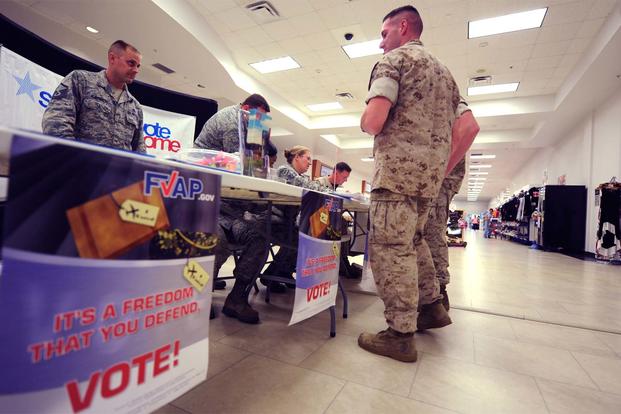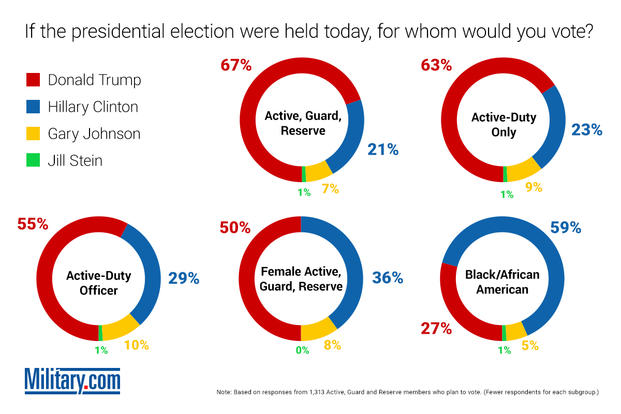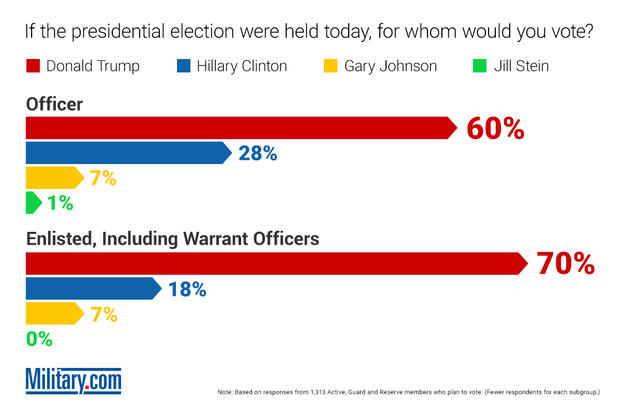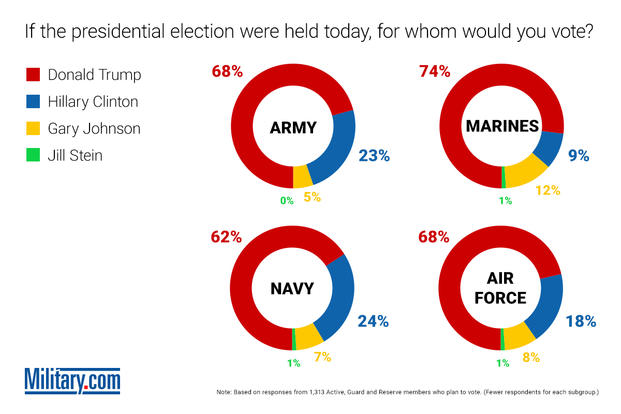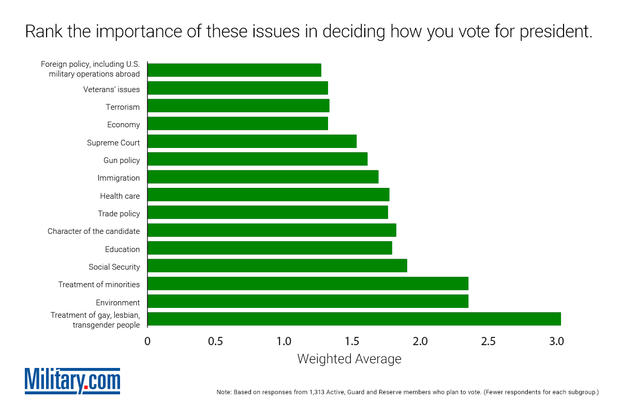Career-oriented troops favor Republican presidential candidate Donald Trump over his Democratic opponent Hillary Clinton by a 3:1 margin, a new Military.com reader survey has found.
Of the more than 1,300 active-duty, National Guard and Reserve members who responded to the questionnaire and plan to vote in the Nov. 8 presidential election, about two-thirds, or 67 percent, said they plan to vote for Trump, while about a fifth, or 21 percent, said they intend to cast a ballot for Clinton.
"Write this down: T-R-U-M-P," said one respondent who identified himself as Hispanic or Latino and politically independent, spelling out the candidate's last name after a reporter introduced himself on the telephone.
"I have a lot of reasons to vote for him because I've been following him my whole career," said the Army major, who requested anonymity to speak freely about the election without fear of professional repercussion. "I know he's wacky … but I really think he cares about us and cares about America. Plus, there are a lot of negatives on Hillary."
Troops for Trump
Across almost every demographic group, from branch of military service to paygrade to gender, Trump was the clear winner in the survey. (The Republican presidential candidate was also heavily favored by thousands more veterans and military spouses who filled out the questionnaire.)
Breaking down results by service, his support was highest among Marines, with 74 percent of Marine Corps and Marine Corps Reserve respondents saying they plan to vote for Trump. That compares to 68 percent of Army, Army Reserve and Army National Guard respondents; 68 percent of Air Force, Air Force Reserve and Air National Guard respondents; and 62 percent of Navy and Navy Reserve respondents.
Trump's lead narrows when the results are filtered for the active component. For example, among only active-duty respondents, 63 percent said they plan to vote for him. His lead further slips when the results are filtered for the officer corps. Among active-duty officers, 55 percent plan to support Trump; 29 percent, Clinton; 10 percent, Gary Johnson, the third-party libertarian candidate; and less than 1 percent, Jill Stein, the Green Party candidate.
RELATED: Vets Back Trump's Plan for More Private Health Care, Survey Says
About six in 10 active-duty, Guard or Reserve respondents, or 59 percent, who identified themselves as Independent said they plan to vote for Trump, compared with about one in four, or 26 percent, who said they intend to vote for Clinton.
About the same percentage of those who identified themselves as Libertarian, or 58 percent, said they plan to vote for Trump, compared with about one in three, or 34 percent, who said they intend to vote for Johnson -- a notable difference from a separate poll of military members but potentially in keeping with recent research indicating many undecided Republicans or one-time Johnson supporters are now backing Trump.
Even among female troops, Trump fared better than Clinton, according to the survey. Just about half, or 50 percent, of female active-duty, Guard and Reserve members said they plan to vote for Trump, while slightly more than a third, or 36 percent, intend to vote for Clinton.
Racial Differences
However, Trump loses to Clinton among black troops, according to the survey. Almost six in 10 respondents, or 59 percent, who identified themselves as black or African American said they plan to vote for Clinton, while more than a quarter, or 27 percent, said they intend to vote for Trump.
An Air Force sergeant who identified himself as black and a Democrat said he can understand how race might play a role in some people's decisions, but it didn't for his. Rather, he cited Clinton's experience as a senator and secretary of state.
"I don't think Donald Trump has anywhere near the foreign policy experience as Sen. Clinton," he said in a telephone interview. "I trust her more as commander in chief, given her experience and everything else."
He added, "I think she's more contrite. I see Donald Trump's vision being very, very partisan, very dark and very weak. I personally feel like he cares more about the Trump brand than the American people."
Military Boost
Six in 10 respondents, or 61 percent, said Trump would do a better job as president handling foreign and military affairs. Seven in 10 respondents, or 70 percent, said he would do a better job as president handling domestic issues such as the economy. And nearly eight in 10 respondents, or 79 percent, said they support Trump's plans to boost the size of the military.
In September, Trump called for increasing the size of the Army to about 540,000 active-duty soldiers, the Marine Corps to 36 battalions, the Navy to 350 surface ships and submarines, and the Air Force to at least 1,200 fighter aircraft.
By comparison, the Pentagon's $583 billion budget proposal for fiscal 2017, which began Oct. 1, requests funding for 460,000 active soldiers, 24 Marine infantry battalions, 287 naval ships and roughly 1,170 fighter aircraft (excluding A-10 ground attack aircraft) -- all for the active component. The figures don't take into account additional troops and equipment for the Guard and Reserve.
Many respondents also said they welcomed Trump's comments that he "would listen to the generals" in deciding on military matters, including combat operations. At the same time, the candidate has suggested he would look to replace military leadership if elected to office: "They'd probably be different generals, to be honest with you," he said during a forum.
ISIS, Afghanistan
Troops listed their five biggest issues, in order of importance, as foreign policy, including U.S. military operations abroad; veterans' issues; terrorism; the economy; and the Supreme Court.
Support for Trump runs high among active, Guard and Reserve members who deployed in support of combat operations, the survey shows. Almost three-quarters, or 73 percent, of respondents who said they served in Iraq or Afghanistan said they back Trump, while just 15 percent said they support Clinton.
Slightly more than half of respondents, or 54 percent, said they support President Barack Obama's decision to keep about 8,400 U.S. troops in Afghanistan next year. A slightly higher percentage, or 59 percent, said they support his decision to deploy about 5,000 U.S. troops to Iraq and about 300 more to Syria to help fight militants affiliated with the Islamic State of Iraq and Syria, or ISIS.
Yet almost half of respondents, or 46 percent -- and highest percentage -- said they oppose Clinton's proposal to create a no-fly zone and safe zone in Syria.
An Air Force pilot who recently returned from a combat zone said he's against the idea because the strategic goal of such an undertaking remains unclear. He also noted that even though Russia supports forces loyal to the regime of Bashar al-Assad -- the U.S. has said the civil war won't end if Assad remains in power -- Russian airstrikes also target ISIS militants.
"The bad guys don't have aircraft -- ISIS doesn't have aircraft," he said. "So what purpose does a no-fly zone serve? To what end? What's the point? Even if we took out Assad, who would fill that vacuum?"
Clinton Email Controversy
The Army major also said he and many of his colleagues are dismayed by the controversy surrounding Clinton's use of a private server to send emails containing classified information. The candidate this week criticized the FBI for launching a new probe into a potentially related matter, saying "there's no case here."
But the officer said the issue goes to her trustworthiness. "If you do something like that recklessly, you get demoted, you get your pay taken," he said, referring to troops who make a similar mistake. "If you do that on purpose, you go to jail for like 15 years."
The controversy has simmered on the campaign trail. Trump has repeatedly raised the issue during both the debates and stump speeches. During the Republican National Convention, Al Baldasaro, a state representative in New Hampshire, delegate for Trump and a Marine Corps veteran, gave a radio interview in which he said Clinton should be "shot for treason" and referenced the case of Marine Maj. Jason Brezler.
The career of Brezler, a reservist and member of the New York City Fire Department, hangs in the balance after he was accused of improperly handling classified material. In 2012, Brezler sent colleagues an email from a Yahoo account containing a classified profile of an Afghan policeman whom the Marines believed was corrupt and sexually abusing young Afghan boys.
The Army officer said he and his colleagues feel Clinton has received a different level of legal scrutiny because of her position and status.
"If we did the same thing, we'd be in jail," he said.
Survey Methodology
Military.com conducted a voluntary online survey of readers from Oct. 24 through Oct. 31. The questionnaire was posted on the website and distributed to readers via newsletters, a mobile alert and on social media.
A total of 17,149 respondents completed the questionnaire, the vast majority of whom were veterans. Except where noted in this story, survey data were filtered for the 1,313 responses from active-duty, Guard and Reserve members who said they plan to vote.
The sample is not a perfect representation of the military as a whole. It includes a higher percentage of airmen, soldiers, officers and noncommissioned officers, and a lower percentage of women, minorities and junior enlisted personnel than are in the force.
However, the high number of NCOs and mid-grade officers who responded represent the more senior and career-oriented members of the military.
-- Brendan McGarry can be reached at brendan.mcgarry@military.com. Follow him on Twitter at @Brendan_McGarry.
